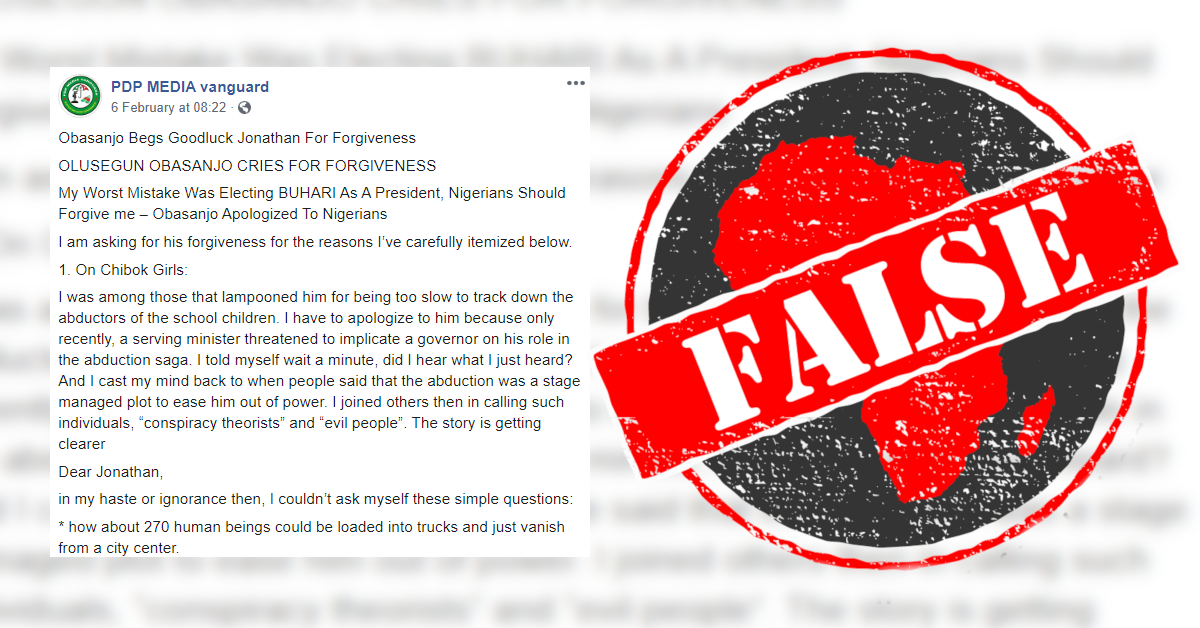A Facebook post claims Olusegun Obasanjo, president of Nigeria from 1999 to 2007, has apologised for not supporting Goodluck Jonathan’s 2015 bid for re-election.
Jonathan was president from 2010 to 2015, when he lost the poll to current president Muhammadu Buhari.
“My Worst Mistake Was Electing BUHARI As A President, Nigerians Should Forgive me – Obasanjo Apologized To Nigerians,” the post reads.
A photo in the post shows Obasanjo and Jonathan together in 2015.
The post has been shared more than 2,100 times, attracting 573 comments so far. But did Obasanjo really ask for Jonathan’s – and Nigerians’ – forgiveness?

Obasanjo is known for writing letters to other Nigerian presidents, past and present, about national issues. The letters have been widely covered in the mainstream media.
But there have been no reports of Obasanjo writing a letter to Nigerians and Jonathan, apologising for supporting Buhari in 2015. Such an apology would have been major news.
And it’s notable that the “apology” was posted on 5 February 2020, two days after newspapers published photos of Obasanjo and Jonathan meeting at the 2020 World Summit in Seoul, South Korea. – Allwell Okpi
Jonathan was president from 2010 to 2015, when he lost the poll to current president Muhammadu Buhari.
“My Worst Mistake Was Electing BUHARI As A President, Nigerians Should Forgive me – Obasanjo Apologized To Nigerians,” the post reads.
A photo in the post shows Obasanjo and Jonathan together in 2015.
The post has been shared more than 2,100 times, attracting 573 comments so far. But did Obasanjo really ask for Jonathan’s – and Nigerians’ – forgiveness?

No reports in mainstream media
Obasanjo is known for writing letters to other Nigerian presidents, past and present, about national issues. The letters have been widely covered in the mainstream media.
But there have been no reports of Obasanjo writing a letter to Nigerians and Jonathan, apologising for supporting Buhari in 2015. Such an apology would have been major news.
And it’s notable that the “apology” was posted on 5 February 2020, two days after newspapers published photos of Obasanjo and Jonathan meeting at the 2020 World Summit in Seoul, South Korea. – Allwell Okpi
Republish our content for free
For publishers: what to do if your post is rated false
A fact-checker has rated your Facebook or Instagram post as “false”, “altered”, “partly false” or “missing context”. This could have serious consequences. What do you do?
Click on our guide for the steps you should follow.
Publishers guideAfrica Check teams up with Facebook
Africa Check is a partner in Meta's third-party fact-checking programme to help stop the spread of false information on social media.
The content we rate as “false” will be downgraded on Facebook and Instagram. This means fewer people will see it.
You can also help identify false information on Facebook. This guide explains how.





Add new comment